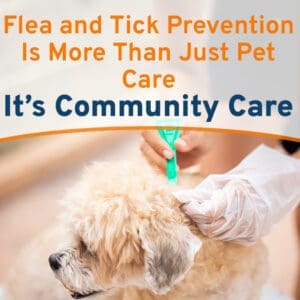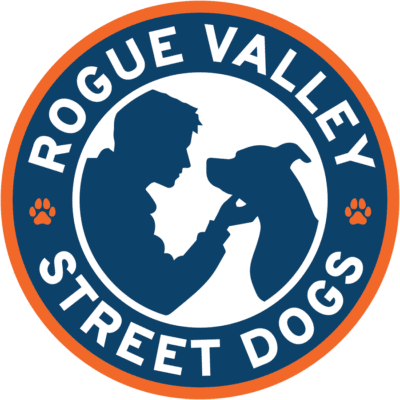 In Southern Oregon, where warm days and damp seasons are the norm, flea and tick prevention isn’t just a seasonal chore—it’s a year-round necessity. For pet owners living in poverty, the cost of monthly treatments can be out of reach. And when pets go without protection, the consequences ripple outward: through neighborhoods, homes, shelters, and even the human healthcare system.
In Southern Oregon, where warm days and damp seasons are the norm, flea and tick prevention isn’t just a seasonal chore—it’s a year-round necessity. For pet owners living in poverty, the cost of monthly treatments can be out of reach. And when pets go without protection, the consequences ripple outward: through neighborhoods, homes, shelters, and even the human healthcare system.
That’s why the work of organizations like Rogue Valley Street Dogs is not only compassionate—it’s critical. By offering free or low-cost flea and tick prevention in collaboration with The Street Dog Coalition to pets unhoused or at risk of being unhoused, this local nonprofit is protecting far more than animals—it’s protecting all of us.
A Perfect Storm for Parasites
Fleas and ticks thrive in places like the Rogue Valley. Our region’s mild winters, wet springs, and long growing seasons create ideal conditions for these parasites to breed and spread. While many assume the danger passes with summer, flea and tick prevention is a year-round need in Southern Oregon.
Fleas can complete their life cycle in less than three weeks when temperatures hover around 70 to 85 degrees with high humidity—conditions we see frequently here. Ticks, meanwhile, aren’t as seasonal as many believe. Certain species remain active whenever it’s above 40°F, which is most of the year in our region. And as our climate shifts, these pests are sticking around longer and spreading faster.
When Prevention Isn’t Possible
For pet owners with limited resources, a $20–$50 monthly flea and tick prevention treatment can be out of reach. But when pets go without it, the costs are far steeper.
A single flea-infested pet can quickly seed an entire household. The animal suffers, often developing flea bite dermatitis or anemia, which is particularly dangerous for puppies, kittens, or sick animals. Ticks bring even greater danger, carrying diseases like Lyme, Rocky Mountain spotted fever, and tick-borne relapsing fever. These illnesses don’t stop at the pet; they can be passed to people, too.
Treatment for infestations isn’t just more expensive than prevention—it’s also more complicated. It means vet bills, environmental cleanup, replacing bedding, and possibly even emergency care. That’s why flea and tick prevention isn’t just a best practice—it’s essential, especially in communities where access to veterinary care is already limited.
The Mission of Rogue Valley Street Dogs
That’s where Rogue Valley Street Dogs comes in. Our volunteer-driven nonprofit has stepped up to fill the gap for pets of those who are unhoused, at risk of homelessness, or living in poverty. By distributing free and low-cost flea and tick prevention, we’re preventing needless suffering and protecting public health in the process.
Our outreach doesn’t stop at handing out treatments. We partner with local veterinarians and other community agencies to offer pop-up clinics, mobile care, and education. We show pet owners how to properly apply treatments, identify signs of parasite-borne illness, and keep living environments clean and safe.
This kind of care goes far beyond medication—it’s building trust, dignity, and well-being between people and their pets.
Why This Benefits Everyone
It’s easy to assume that helping one pet helps just that animal. However, flea and tick prevention has a community-wide impact.
When one pet is protected, it reduces the overall parasite population in that area. This helps prevent fleas and ticks from spreading to other animals—whether that’s the next-door neighbor’s dog or a feral cat under someone’s porch. It also reduces the risk of zoonotic diseases jumping from pets to humans.
For shelters and rescues, every pet kept healthy in the community is one less crisis call, one less emergency intake, and one less strain on an already stretched system.
And let’s not forget the emotional toll on the humans. For someone living in poverty, a pet may be their only companion. Watching that companion suffer from preventable illness, or having to surrender it because they can’t afford care, is a trauma no one should have to face.
How You Can Help
If you’re reading this and wondering how to make a difference, here are a few simple but powerful ways to support flea and tick prevention efforts in your own community:
- Donate: Your dollars help cover the cost of effective, vet-approved preventives that are distributed directly to those in need.
- Volunteer: Join a clinic, help distribute supplies, or assist with educational outreach.
- Spread the word: Share information about Rogue Valley Street Dogs and the importance of flea and tick prevention with others.
- Partner up: If you own or work for a veterinary clinic, pet store, or outdoor gear shop, consider a partnership or sponsorship.
Every contribution—whether it’s time, money, or sharing knowledge—helps break the cycle of poverty-based pet neglect and disease. It creates a healthier, safer Rogue Valley for all.
A Safer, Healthier Future for Pets and People
Fleas and ticks might be tiny, but their impact is huge. So is the difference we can make by ensuring that every pet, no matter their owner’s income level, has access to the protection they need.
By supporting the flea and tick prevention efforts led by Rogue Valley Street Dogs, you’re not just showing compassion—you’re taking action. You’re helping families stay together, animals remain healthy, and our community stays strong.
Let’s stand together—for the people, the pets, and the promise of a better life for both. Visit our website to learn more and find out how you can get involved in helping our community.

Reader Interactions